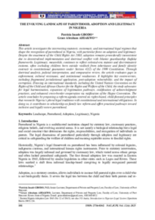This article investigates the intersecting statutory, customary, and international legal regimes that shape the recognition of parenthood in Nigeria, with particular focus on adoption and legitimacy. Despite the enactment of the Child Rights Act 2003, adoption remains procedurally inconsistent due to decentralised implementation and doctrinal conflict with Islamic guardianship (kafala) frameworks. Legitimacy, meanwhile, continues to reflect colonial-era statutes and discriminatory customs, often excluding children born outside wedlock from inheritance and family identity contrary to constitutional guarantees under Section 42(2) of the 1999 Constitution. Through doctrinal analysis, judicial interpretation, and comparative review, the article evaluates gaps in enforcement, cultural resistance, and institutional weaknesses. It highlights key controversies, including fragmented jurisdictional application, post-adoption vulnerability, and the impact of corruption. Drawing on international standards, including the United Nations Convention on the Rights of the Child and African Charter for the Rights and Welfare of the Child, the study advocates for legal harmonisation, expansion of legitimation pathways, codification of acknowledgment practices, and enhanced cross-border cooperation via ratification of the Hague Convention. The article concludes by proposing a reform agenda centred on rights-based, child-focused principles that reconcile Nigeria’s plural legal traditions with constitutional and international obligations. In doing so, it contributes to scholarship on family law reform and offers practical pathways toward inclusive and legally secure parenthood.

